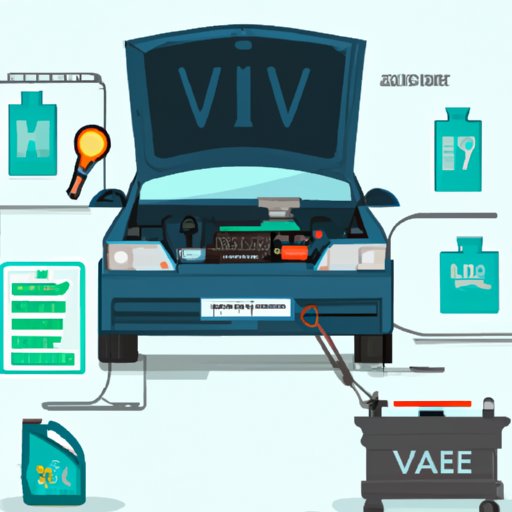Introduction
Taking a road trip can be an exciting adventure, but it’s important to make sure your car is ready for the journey. It’s essential to perform necessary maintenance and repairs before hitting the open road, as this will ensure your safety and reduce the chance of costly breakdowns. In this article, we’ll explore what to check on your car before a road trip and why it is important.
Tire Pressure
The first thing you should check on your car before a road trip is the tire pressure. Properly inflated tires are important for several reasons. According to the National Highway Traffic Safety Administration (NHTSA), “under-inflated tires can lead to poor handling, longer stopping distances, and reduced fuel economy.” Additionally, under-inflated tires can cause uneven wear and increase the likelihood of a tire blowout. To ensure your tires are properly inflated, use a tire pressure gauge to measure the air pressure in each tire. The owner’s manual should indicate the proper inflation level for the vehicle.
Brakes
Next, it is important to inspect the brakes and replace brake pads if necessary. Worn brake pads can cause the brakes to lose effectiveness and increase stopping distance. According to the NHTSA, “brake pads should be checked at least once a year or every 12,000 miles.” To inspect the brakes, look for signs of wear such as thinning of the brake pad material or metal scraping against the rotor. If the brake pads need to be replaced, take the car to a qualified mechanic or do it yourself if you have the necessary tools and skills.
Battery Voltage
Another important step before taking a road trip is to test the battery voltage. A weak battery can cause a host of problems, including slow starts, electrical system malfunctions, and even stalling. To test the battery voltage, use a multimeter to measure the voltage of the battery. Most batteries should read between 12.4 and 12.7 volts. If the voltage is too low, it may be necessary to replace the battery.
Engine Oil
It is also important to replace the engine oil and oil filter before a road trip. Old oil can break down over time and become less effective at lubricating the engine, which can lead to increased wear and tear. It is recommended to change the engine oil and oil filter every 3,000 to 5,000 miles, depending on the type of oil used and the driving conditions. Changing the engine oil and oil filter is relatively easy and can be done with basic tools.
Lights
It is also important to make sure all lights are working properly before taking a road trip. Burned out headlights and taillights can limit visibility at night and make it difficult for other drivers to see you. It is also illegal to drive with non-working lights in most states. To check the lights, turn on the headlights, taillights, turn signals, and emergency flashers and make sure they are all functioning properly. If any of the lights are not working, replace the bulbs as soon as possible.
Windshield Wipers
Finally, it is important to check the windshield wipers and top off the washer fluid before a road trip. Windshield wipers should be inspected for signs of wear and tear, such as cracks or tears in the rubber blades. It is also important to make sure the washer fluid reservoir is full. Driving in heavy rain or snow can be dangerous if you cannot see clearly due to dirty or fogged up windows. Topping off the washer fluid reservoir will help keep the windshield clean and clear.
Conclusion
In summary, it is essential to perform necessary maintenance and repairs on your car before taking a road trip. Checking the tire pressure, brakes, battery voltage, engine oil, lights, and windshield wipers is important for ensuring a safe and successful journey. Taking the time to do these things before a road trip will save you time and money in the long run.
(Note: Is this article not meeting your expectations? Do you have knowledge or insights to share? Unlock new opportunities and expand your reach by joining our authors team. Click Registration to join us and share your expertise with our readers.)
